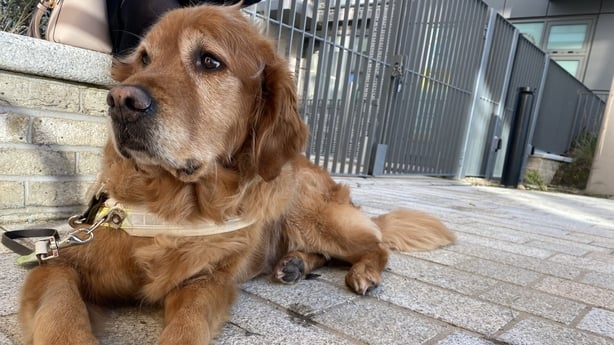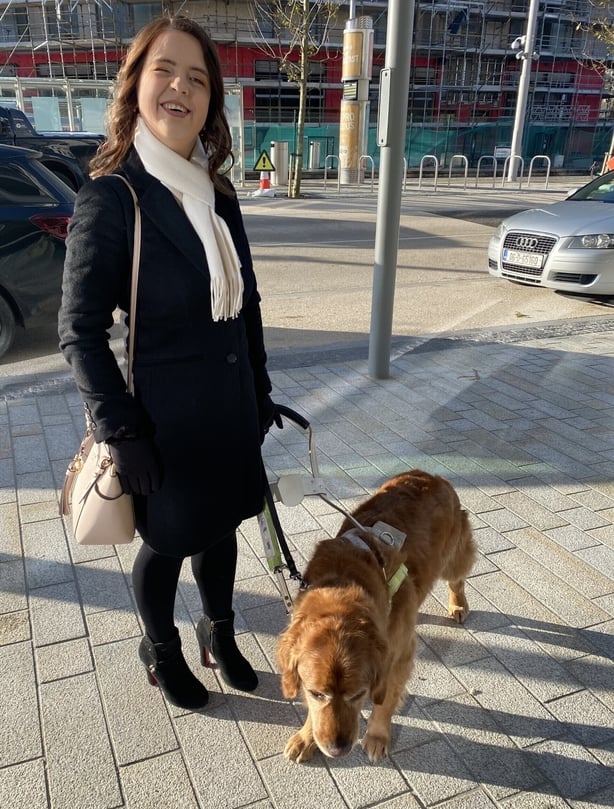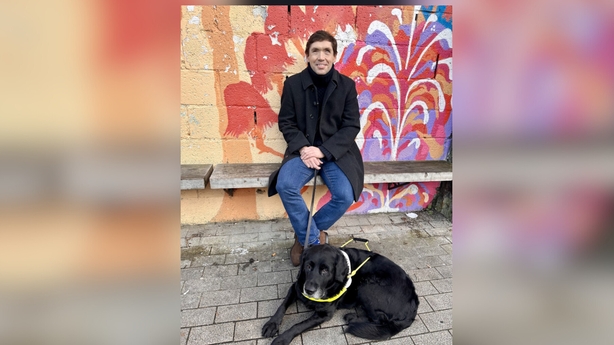An increasing number of guide and assistance dog owners are facing difficulties in accessing services and amenities, according to the Irish Guide Dogs for the Blind.
Incidents of refusal to public premises are occurring more regularly, according to the organisation, despite it being the legal right of the dog owners.
A recent survey by IGDB found that in the previous 12 months the majority (83%) of guide dog and assistance dog owners had a negative experience in trying to access services and amenities.
A third were allowed access once they explained their legal rights and nearly a quarter said they had no choice but to walk away because refusal was outright.
Sectors causing the most difficulty included retail, hospitality, transport, public amenities and some medical facilities.
Irish equality legislation gives guide and assistance dog owners the right to access businesses and services without discrimination.
This includes access to all forms of public transport, all forms of hospitality accommodation and all establishments that provide food, including cafes, restaurants, pubs, delis and supermarkets.
Under the UN Convention on the Rights of Persons with Disabilities, public and private service providers are obliged to be inclusive when it comes to accessibility and participation.
The IGDB is calling on authorities to investigate reported incidents and to prosecute or fine where appropriate so that service providers comply with legislation.
Sarah McGowan has had her guide dog Mossy for five years.
Despite legislation which enables guide dogs and assistance dogs to enter premises, Sarah is regularly challenged over Mossy's presence in restaurants and retail outlets like clothes shops.
Last week she went into a shop where a worker told her she would have to leave with the dog.
When Sarah explained he was a guide dog and that he had a legal right to be in the store, the girl agreed but said other customers may not like dogs.
Ms McGowan has become immune to these interactions.
"I'm expecting it, which is probably a really bad thing."


Recently, the 23-year-old was refused access to a hospital by its security because of Mossy. Sarah's mother was with her at the time and wanted to enter to see Sarah’s grandmother.
"I informed him of the legislation, and he said he would have to check with his manager."
After some time, the manager cleared access through a walkie talkie, and they were allowed to enter the building.
What occurred next, is what Sarah views as one of the most frustrating aspects of being disabled in Ireland.
"He didn't address me at all. He didn't apologise to me as a person who was actually excluded from the hospital, and I just find that is a consistent issue.
"People consistently address my companions rather than me, despite the fact I am the person with the dog, that I'm the person who knows my dog's needs and people don't seem to think that I can answer questions for myself."
When a guide dog or assistance dog owner is told they cannot enter a business, access a service, or is challenged about their entry because they have their dog with them it’s known as access refusal which appears to be on the rise since the Covid-19 pandemic.
The Irish Guide Dogs for the Blind says access refusals impact people in a variety of ways including on their confidence, independence, wellbeing and, most of all, their right to participate as equal citizens in Irish society.
Martin Gordon, who has been a guide dog owner for over 20 years and is an IGDB board member, can't put his finger on why there has been an increase in refusals over the last 18 months.
"It could be a combination of awareness, a combination of training of staff and management in different organisations, companies, premises, services," he said.
Mr Gordon also believes there is intolerance of and discrimination towards people with disabilities in Ireland.

"People with guiding assistance dogs are like every other member of the community. They have a statutory right to access any sort of services that are under the equal Equal Status Act. The legislation has been in place for so long now," he said.
Mr Gordon, who is a barrister, said the survey demonstrated that is is a nationwide problem.
He told RTÉ's News at One: "Discrimination is unfortunately very much present and on the rise.
"If you are going to open your doors to the public you must open your doors to all members of the public, you cannot just pick and choose.
"And if you are in business, you have a responsibility as a business owner to meet all your legal obligations and responsibilities and that is ensuring that yourself and all of your staff are aware of the legal rights of people with disabilities.
He said the onus comes down to the business owners to make sure staff are aware.
He added that it is a two-way street and guide, and assistance dog users must make sure their dog is clean, well-groomed and in harness.
"Unfortunately, we are coming up against resistance from Irish business owners and representative bodies of these business owners," he added.
Both Ms McGowan and Mr Gordon believe that training and education is required.
Ms McGowan believes some people are aware of "the basics" but are not fully informed.
"There are people who, as you're walking - and he's obviously working - will just stick their hand out and rub his head and distract him. That's not ok. It's generally just a lack of consideration on some people's parts, perhaps education and in some cases lack of information."
Mr Gordon believes it is a combination of factors such as awareness and training of staff, which is the responsibility of a business owner or management and general awareness of the rights and access rights of people with disabilities by the public.
Ultimately, the independence and mobility offered by dogs like Mossy is being hindered by wider society.
Chief Executive Officer Tim O’Mahony says there has always been huge support for the Irish Guide Dogs for the Blind from the public, and he has acknowledged that the general public is fascinated by the impact their dogs have.
"We’re asking now for continued support to ensure that welcome extends across all areas of life," he said.
We need your consent to load this rte-player contentWe use rte-player to manage extra content that can set cookies on your device and collect data about your activity. Please review their details and accept them to load the content.Manage Preferences






